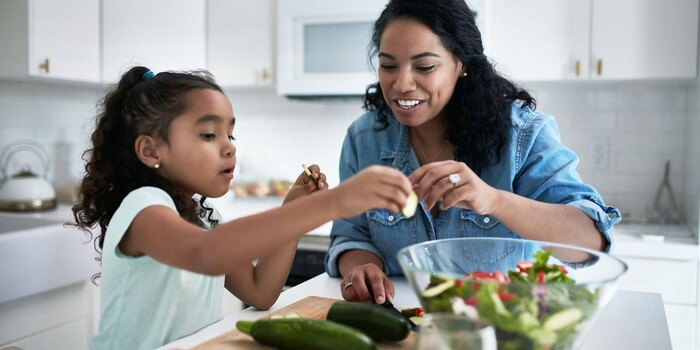Food and nutrition – your common questions answered
Wondering whether you need to eat breakfast? Or perhaps you’re not sure if you’re eating enough protein? Online food-related searches suggest that many of us have questions when it comes to our diet.
Here, we’ll explore some commonly asked questions related to food and nutrition.

Do I need to eat breakfast?
Breakfast is an important meal and provides many benefits. So it’s a good idea to try not to skip it. Breakfast can look different for each person. You may choose to eat as soon as you wake up, or an hour or two later.
Breakfast gives you energy and brainpower for the day ahead and can help your body to learn hunger cues. It can also help you to maintain a healthy weight. For teenagers and children, breakfast helps them to get the nutrients they need for healthy development and learning.
Some people might skip breakfast as a part of intermittent fasting. This is when you go for extended periods of time without eating. This might have some potential benefits, such as improved gut health, but more evidence is needed.
Eating breakfast is recommended. But if you skip breakfast, you should make sure you get all the nutrients you need in your other meals or snacks.
How much protein should I eat?
The current recommendation is to eat around 0.75g of protein per kilo of body weight per day for adults. But athletes and older adults may need more protein each day.
In the UK, it’s recommended to get your protein from a variety of animal and plant sources. This could include:
- meat
- fish
- eggs
- quinoa
- tofu and tempeh
- beans, peas and lentils
- nuts and seeds
Do I need vitamin and mineral supplements?
Ideally, you should be able to get all the nutrients you need from a healthy, balanced diet. But in some cases you may need to take vitamins and minerals.
- In the UK, it’s recommended that you take vitamin D from October to March, as it’s hard to get enough from the sun. If you have dark skin or don’t get much exposure to sunlight you should consider taking it throughout the year.
- If you follow a vegan diet, you may need to take vitamin B12 and iodine.
- If you have iron deficiency anaemia, you may need to take iron.
- If you’re pregnant or trying to get pregnant, you should take folic acid.
Speak to a GP or a dietitian for more advice about whether you would benefit from a supplement.
What is a balanced diet?
A balanced diet is one that includes a variety of foods from all the food groups.
- Fruit and vegetables – try to get at least five portions a day.
- Carbohydrates, such as bread, pasta, and rice. Try to choose wholegrain and high fibre options.
- Protein foods, such as meat, fish, eggs, and beans – aim for a variety of sources. Try to limit the amount of red and processed meat.
- Dairy foods and alternatives, such as milk, yoghurt, and cheese – you could try lower fat and lower sugar options.
- Fats and oils – use small amounts and aim for unsaturated types, such as olive oil.
- Foods high in fat, salt, and sugar – try to limit your portions and eat less often.
The UK Government’s Eatwell Guide (PDF, 7.8MB) shows the amount of each food group that you should aim to include in your diet. You should also make sure that you’re staying hydrated. Try to aim for around six to eight glasses of fluid a day.
How can a dietitian help me?
Dietitians are experts in food and nutrition. They assess, diagnose, and treat problems related to diet and nutrition. You might go to see a dietitian for reasons such as:
- digestive problems, such as irritable bowel syndrome
- difficulties with feeding your baby or child
- food allergies and intolerances
- medical conditions, such as diabetes, high blood pressure or cardiovascular disease
- help with losing or gaining weight safely
- advice about eating disorders
A GP may refer you to a dietitian or you could search for one yourself. Dietitians are regulated by law, meaning that they must meet certain standards to use the title. If you look for one, check that they’re registered with the Health & Care Professions Council (HCPC).
Are you interested in learning more about your health? Discover more about our range of health assessments.
-
Sources Sources
- Breakfast. BetterHealth Channel. betterhealth.vic.gov.au, reviewed December 2023
- Healthy Breakfast. British Dietetic Association (BDA). bda.uk.com, published July 2020
- Breakfast skipping means children may not be getting all the nutrients they need, warns new report. British Nutrition Foundation. nutrition.org.uk, published November 2023
- Patterson RE, Sears DD. Metabolic effects of intermittent fasting. Annual Review of Nutrition 2017;37:371–393. doi: 10.1146/annurev-nutr-071816-064634
- Protein. British Nutrition Foundation. nutrition.org.uk, last reviewed October 2023
- Protein: what you need to know. British Heart Foundation. bhf.org.uk, accessed May 2024
- Vegetarian, vegan and plant-based diet. British Dietetic Association. bda.uk.com, published April 2021
- Vitamins and minerals. British Nutrition Foundation. nutrition.org.uk, last reviewed October 2023
- Supplements. British Dietetic Association. bda.uk.com, published May 2022
- A healthy, balanced diet. British Nutrition Foundation. nutrition.org.uk, last reviewed October 2023
- The Eatwell Guide. Office for Health Improvement and Disparities. gov.uk, last updated January 2024
- How can a dietitian help you? British Dietetic Association. bda.uk.com, accessed May 2024
- What is a dietitian? British Dietetic Association. bda.uk.com, accessed May 2024
About our health information
At Bupa we produce a wealth of free health information for you and your family. This is because we believe that trustworthy information is essential in helping you make better decisions about your health and wellbeing.
Our information has been awarded the PIF TICK for trustworthy health information. It also follows the principles of the The Information Standard.

More diet and nutrition articles
Did you find our advice helpful?
We’d love to hear what you think. Our short survey takes just a few minutes to complete and helps us to keep improving our healthy lifestyle articles.
Legal disclaimer
This information was published by Bupa's Health Content Team and is based on reputable sources of medical evidence. It has been reviewed by appropriate medical or clinical professionals and deemed accurate on the date of review. Photos are only for illustrative purposes and do not reflect every presentation of a condition.
Any information about a treatment or procedure is generic, and does not necessarily describe that treatment or procedure as delivered by Bupa or its associated providers.
The information contained on this page and in any third party websites referred to on this page is not intended nor implied to be a substitute for professional medical advice nor is it intended to be for medical diagnosis or treatment. Third party websites are not owned or controlled by Bupa and any individual may be able to access and post messages on them. Bupa is not responsible for the content or availability of these third party websites. We do not accept advertising on this page.







